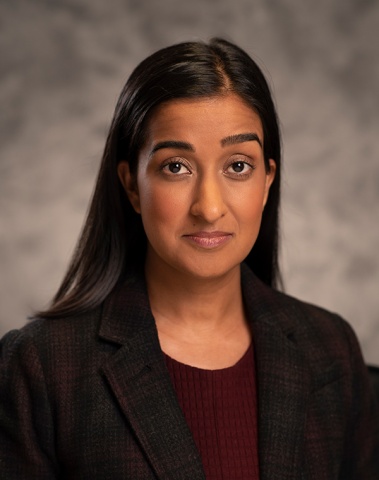The international experience that I gained at the Ford School gave me a perspective on what’s needed, how programs can work, and what they can do to change some people's lives.”

Zara Ahmed
Social Media: https://twitter.com/ZarainDC
First job out of Ford School: ASPH/CDC Allan Rosenfield Global Health Fellow - CDC
Zara Ahmed (MPP/MPH '09), associate director for federal issues at the Guttmacher Institute, spent seven years overseas with the U.S. Centers for Disease Control and Prevention in Rwanda, Namibia, and Haiti, before coming back to the U.S. to advocate for international health issues and Congressional appropriations, including for sexual and reproductive health access during the COVID-19 crisis. Ahmed says her exposure to field work, in-depth policy study, and interdisciplinary approach at the Ford School gave her the skills needed to be a competitive asset to an ever-changing political environment. It also gave her the confidence and ability to lead, ask the right questions, and translate the technical aspects of public health to policymakers, especially when her boss left three months into Ahmed’s first position in Rwanda, leaving her in charge.
After completing her undergraduate education and realizing that her life-long plan to work on the Hill actually wasn’t for her, Ahmed decided to pursue an MPP/MPH dual degree. “I recognized the value of having a lot of cross-cutting analytical skills, but also wanted both depth and breadth in my policy knowledge. Only U-M could give me that,” said Ahmed recalling how she made her decision. At U-M, Ahmed became multi-disciplinary, and leveraged her access to different schools and resources on campus. In three years, she participated in four global applied learning opportunities, with limited out-of-pocket costs. She traveled to Cambodia as part of the Law School’s Program for Cambodian Law and Development and did a practicum on sex worker unions; to Cameroon (paid for by the Ross Business School) to study health financing; Bangladesh as a representative of the U-M Labor Standards Board; and to Senegal as part of the Ford School’s International Economic Development Program.
Ahmed explains that her field experience and dual degree helped her stand out to employers. “In policy, you're going to cover on a range different issues over the course of your career, especially if you work in advocacy, like I do. The topics you work on and the audiences you engage with will change over time, so having the ability to think creatively and flexibility is critical. Being able to bring together different skill sets and knowledge bases—public policy and public health, in my case—is valuable to the people and organizations I work for; they get two perspectives and sets of expertise for the price of one,” said Ahmed. “Hopefully, I’m demonstrating what people can gain from interdisciplinary studies at Michigan and how uniquely beneficial a dual degree education can be,” said Ahmed.
Ahmed says that public policy graduates need to be able to juggle three competing demands in the modern workplace: speed, quality, and volume. “We don't live in a world where you can be a targeted laser beam and just do one thing really well. We live in a world where everyone has to be a Swiss Army Knife. Today, as a manager I don't need you to do one thing; I need you to do a million different things really well and quickly.” Ahmed credits the Ford School with equipping her to do that and is grateful for the analytic, writing, and communication skills she gained during her time in Ann Arbor. Those skills allow her to synthesize large amounts of information and bridge the gap between theory and practice. She says that her MPH and MPP degrees together gave her the skills to see the size and scale of health needs on the ground and find pragmatic policy solutions to address those needs.
Ahmed explains her passion for health equity was nurtured at the Ford School. She emphasizes that in global health, you have to be an optimist. “The international experience that I got at the Ford School gave me perspective on what’s needed, how programs can work, and what they can do to change people's lives. So much work remains to be done but I know that if more smart, passionate people get involved, we can make change happen.”